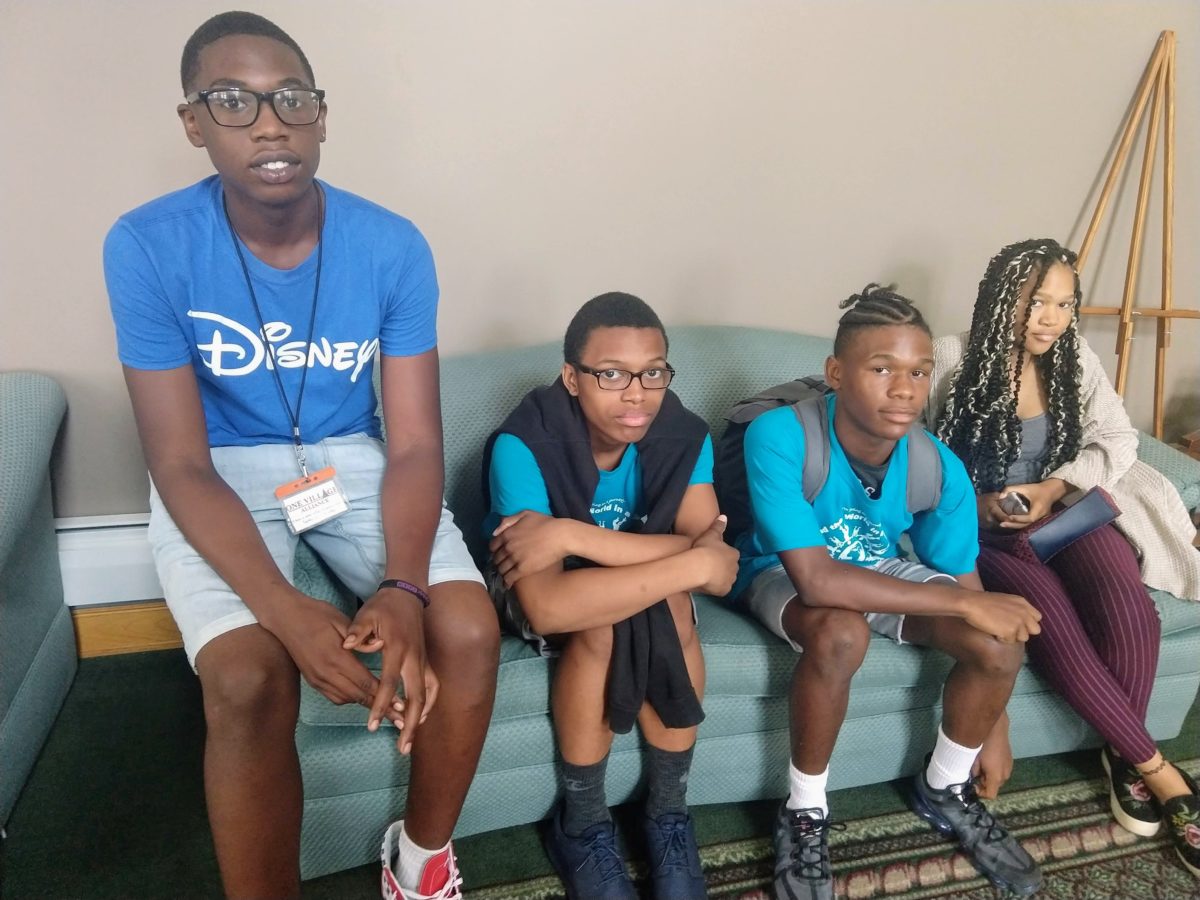It’s back to school time in Wilmington.
Kids from neighborhoods such as the North Side, Southbridge, East Side and Hilltop might have longer bus rides than their peers attending elite charters and private schools: There are no public high schools in the city that don’t curate their student bodies, with the former Wilmington High now the home of Charter School of Wilmington and Cab Calloway School of the Arts.
The classrooms made up of the students in those neighborhoods definitely have more melanin in them. They’re also not as hellish as people like to make out, at least to the kids.
A few weeks ago, Technical.ly sat down with several teens in a summer program for One Village Alliance — all from neighborhoods labeled “inner city,” primarily on the North Side — who came together for a roundtable talk about school, access and perception, from the point of view of kids who are rarely given a voice in the subject.
Here’s the thing: When public (and votech) schools are presented, they are usually boiled down to an on-paper “snapshot” that include proficiency numbers that don’t acknowledge that, for example, kids with special needs are less accommodated at high-scoring elite schools.
It’s been said that, regardless of the numbers, middle-class white kids can thrive in public schools. But when it comes to African American kids from the city, two types tend to come to mind: The superstar exceptional achievers, and the criminals.
There’s little room for the average, football-playing, video game-loving kid who may or may not know what they’re going to be when they grow up.
Perception is subjective.
The One Village students are all very aware of the violence that impacts their neighborhoods. They’ve known kids who have gotten pulled into it. Still, they say they like where they live.
“You don’t think you live in a bad neighborhood?” asks Chandra Pitts, founder of One Village Alliance.
They all say no.
“It’s about who you associate with,” says 15-year old Chris Laws, who studies digital design at Delcastle Technical High School. “But you can walk pretty much anywhere.”
“You have to be aware of your surroundings, but you can walk around,” adds Demetrius Bright, who lives on the North Side.
“Would you walk around on the East Side, though?” asks Pitts.
“Yeah, I’d walk around the East Side,” he says, then pauses. “I mean, you have to be aware of the situation.”
When it comes to school, all feel safe.
Chris plans to go into animation. Delcastle focuses on teaching trades, but he points out that it’s not a school for kids who just don’t want to go to college. “Votechs send multiple kids to college,” he says.
Demetrius, 15, goes to Brandywine High School. He’s undecided about college. His biggest concern about continuing education after high school? “I’m used to my neighborhood and living in the city,” he says. “I would miss it.”
Jayden Scott-Davis, 15, studies carpentry at Delcastle. It’s a trade he plans to go into after high school. “I want to build houses for the community,” he says.
Deajahniya Barlow, 15, attends Mount Pleasant High School, where she takes culinary classes. “We have two [restaurant] kitchens,” she says with pride. She talks about a student a couple of years ahead of her who landed a full culinary school scholarship. She plans to go to culinary school, too.
“Does your school offer coding?” I ask.
“Yes,” Chris says. “If you ask. You have to be proactive.”
“Art?”
All say yes, though Delcastle’s non-technical art classes are held as an extracurricular after school.
“Music?”
All say yes, especially marching band.
“Access to college preparation?”
This gets a mixed response. Chris, Jaden and Deajahniya nod yes. Demetrious is less sure.
“I think there’s not much access to that at Brandywine,” he says. (Brandywine does offer college counseling, even if every kid isn’t aware of it.)
A final question: “How do you feel when people say your school is bad?”
“People make fun of our school,” says Deajahniya, shaking her head.
“They make it seem like it’s something it’s not,” said Chris. He admits that he’s believed some of the demonization himself. “We heard that A.I. [duPont High School] was so dangerous, there were fights all the time,” he says. “But I went there once, and it was just a regular school, with regular classes.”
Ayanah Jones, a recent MOT Charter graduate who works for One Village and is getting ready to study business at the University of Delaware, nods.
“At the end of the day, we’re all people.”
Before you go...
Please consider supporting Technical.ly to keep our independent journalism strong. Unlike most business-focused media outlets, we don’t have a paywall. Instead, we count on your personal and organizational support.
3 ways to support our work:- Contribute to the Journalism Fund. Charitable giving ensures our information remains free and accessible for residents to discover workforce programs and entrepreneurship pathways. This includes philanthropic grants and individual tax-deductible donations from readers like you.
- Use our Preferred Partners. Our directory of vetted providers offers high-quality recommendations for services our readers need, and each referral supports our journalism.
- Use our services. If you need entrepreneurs and tech leaders to buy your services, are seeking technologists to hire or want more professionals to know about your ecosystem, Technical.ly has the biggest and most engaged audience in the mid-Atlantic. We help companies tell their stories and answer big questions to meet and serve our community.
Join our growing Slack community
Join 5,000 tech professionals and entrepreneurs in our community Slack today!

The person charged in the UnitedHealthcare CEO shooting had a ton of tech connections

From rejection to innovation: How I built a tool to beat AI hiring algorithms at their own game

Where are the country’s most vibrant tech and startup communities?



